The Museums and their Community in Havana, Cuba: the case study of an educational program for the protection of heritage and its environment
Keywords:
environmental education, museums, heritage, provincial heritage, environment programAbstract
With the aim of contributing to a paradigm shift from domination to harmony in the relationship between <<human beings>>, <<society>>, and <<non-human nature>>, this study highlights the potential to preserve and promote Heritage conservation through an environmental education strategy. This strategy includes transformative actions in the environment coordinated through museums, which serve as educational agencies of territorial significance and actively involve the community as a central and decisive participant. The strengths and potential of these institutions to protect heritage and strengthen local identity are illustrated through the Provincial Heritage and Environment Program. Projects such as the creation of the Rainbow Groups movement, the Rainbow Routes initiative, Green Map, and Overcoming, among others, together with workshops, events, lectures, competitions, clean-up campaigns, and numerous other activities carried out by eighteen municipal and specialized museums, showcase the results achieved with and within the community. These projects also provide insights into experiences implemented since 2006. Collectively, they have contributed to raising environmental and heritage awareness across the region. Over 350,000 individuals from all municipalities in the capital have participated in the diverse activities with social and cultural impact over the past fifteen years. The comprehensive, diverse, and widely participatory approach to environmental action represents an innovative model within the Heritage system, both for this province and the country as a whole. This Program has earned various national and international recognitions and awards.
Downloads
References
Alonso Fernández, L. (2003): Introducción a la Nueva Museología. Arte y Música, Alianza Editorial. Madrid, España., 208 p.
Bidart, Cisneros L., M. L. Ventosa Zenea y D. Rodríguez Velásquez (2006): Mapa Verde: una mirada al desarrollo local. Publiaciones
Acuario. Centro Félix Varela., La Habana, 2006. 2da. Edición.: 79 p.
Capra, F. (1996): The Web of Life. Anchor Books, New York, Editorial Anagrama, S.A., Barcelona 1998, 2da Ed., 1999.
Carrizo, Luís (Ed.), Mayra Espina, y Julie Thompson Klein (2003): Transdisciplinariedad y complejidad en el análisis social. En escuela regional de verano 2003 para América Latina y el Caribe del Programa MOST de UNESCO, sobre “Desarrollo Local y Gobernancia.
Enfoques transdisciplinarios.”, realizada en Punta del Este, Uruguay, del 27 de Octubre al 1º de Noviembre de 2003.
Cedeño Pineda, R. (2008): El arquetipo del <>en la TV cubana. En Sociedad. La Calle del Medio. Nov, 2008.:2p.
Delgado, C. (2007). Hacia un Nuevo Saber: La bioética en la revolución contemporánea del saber. Publicaciones Acuario. Centro Félix Varela. La Habana. 199p.
Delgado, M. A., M. I. Romero Sarduy y J. R. Vidal Valdez (2008): ¿Qué es la Educación Popular? Ed. Caminos, La Habana, 2008: 351 p.
Dumoulin, J. (1973): Cultura, sociedad y desarrollo. Instituto del Libro, La Habana, 1973:388 p.
López Hurtado, J. (2004): Un nuevo concepto de educación infantil. Ed. Pueblo y Educación, Playa, Ciudad de La Habana, Cuba. :30 p.
Martí, José. Obras Completas. Tomo 23, Página 44.
Núñez Moreno, L., M. Espinosa Prieto, L. Martín Posada, L. Vega Quintana, A, Rodríguez Chailloux y G. Ángel Sierra (2008): Perspectivas Metodológicas Socioambientales: Población cubana y comunidades locales. La Habana: Ed. Caminos, 2008.272 p.
Páez Costa, Juan (2009): Los museos, escuelas de identidad (I parte). Rev. Digital CUBARTE. El Portal de la Cultura Cubana, 25 dic. 2009
Páez Costa, Juan (2018). La Dimensión Ambiental de la Superación Profesional para museólogos municipales en La Habana”. Tesis en opción al grado de Doctor en Ciencias Pedagógicas. Universidad de Ciencias Pedagógicas “Enrique José Varona”. La Habana. 21 Anexos. 240p.
Pino M. (2004): El conocimiento de si mismo y sus posibilidades. Ed. Pueblo y Educación, Playa, Ciudad de La Habana. : 60 p.
Rodríguez Velázquez, D., Bidart Cisneros, L., Ventosa Zenea, M. L. y Rodríguez, N. (2008): Caminando por el Mapa Verde de Cuba. La Habana: Acuario.
Tolba, Mostafa K. (1992): Salvemos el Planeta. Problemas y esperanzas. Chapman & Hall., Londres:287 p.
Valle Lima, A. D. (2007): Algunos Modelos Importantes en la Investigación Pedagógica. Instituto Central de Ciencias Pedagógicas. Ministerio de Educación. Cuba: 114 p.
Published
How to Cite
Issue
Section

This work is licensed under a Creative Commons Attribution-NonCommercial-ShareAlike 4.0 International License.
Derechos del/de autor/es a partir del año de publicación
Esta obra está bajo la licencia:
Creative Commons Reconocimiento-NoComercial-CompartirIgual 4.0 Internacional (CC BY-NC-SA 4.0)
Las opiniones expresadas por los autores no necesariamente reflejan la postura del editor de la publicación ni de la UCLA. Se autoriza la reproducción total o parcial de los textos aquí publicados, siempre y cuando se cite la fuente completa y la dirección electrónica de esta revista. Los autores(as) tienen el derecho de utilizar sus artículos para cualquier propósito siempre y cuando se realice sin fines de lucro. Los autores(as) pueden publicar en internet o cualquier otro medio la versión final aprobada de su trabajo, luego que esta ha sido publicada en esta revista.



